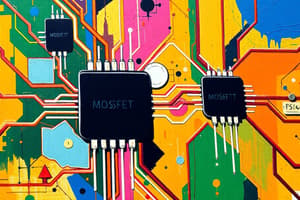Podcast
Questions and Answers
What distinguishes a field-effect transistor (FET) from a bipolar junction transistor (BJT)?
What distinguishes a field-effect transistor (FET) from a bipolar junction transistor (BJT)?
- FET has low input impedance, while BJT has high input impedance.
- FET is a voltage-controlled device, while BJT is a current-controlled device. (correct)
- FET uses two charge carriers, while BJT depends on either electrons or holes.
- FET is a bipolar device, while BJT is a unipolar device.
Which type of charge carriers does the field-effect transistor (FET) depend on for conduction?
Which type of charge carriers does the field-effect transistor (FET) depend on for conduction?
- Protons
- Holes only
- Electrons only
- Both electrons and holes (correct)
What is the most significant characteristic of a field-effect transistor (FET)?
What is the most significant characteristic of a field-effect transistor (FET)?
- Bipolar device
- Current-controlled device
- High input impedance (correct)
- Low input impedance
Which of the following is NOT a type of field-effect transistor (FET)?
Which of the following is NOT a type of field-effect transistor (FET)?
What does the prefix 'bi-' in 'bipolar device' indicate about the conduction level of the transistor?
What does the prefix 'bi-' in 'bipolar device' indicate about the conduction level of the transistor?
What is the main difference between a BJT transistor and an FET transistor?
What is the main difference between a BJT transistor and an FET transistor?
What does the prefix 'bi-' in 'bipolar device' reveal about the BJT transistor?
What does the prefix 'bi-' in 'bipolar device' reveal about the BJT transistor?
Which type of field-effect transistor (FET) relies on either electron or hole conduction?
Which type of field-effect transistor (FET) relies on either electron or hole conduction?
What is the fundamental difference between n-channel and p-channel field-effect transistors (FETs)?
What is the fundamental difference between n-channel and p-channel field-effect transistors (FETs)?
Which type of device is a BJT transistor, and why?
Which type of device is a BJT transistor, and why?
Flashcards
FET vs. BJT
FET vs. BJT
A field-effect transistor (FET) is a voltage-controlled device where the current flow is regulated by an electric field, while a bipolar junction transistor (BJT) is a current-controlled device where current flow is influenced by the injection of charge carriers.
FET Charge Carriers
FET Charge Carriers
Field-effect transistors can utilize both electrons and holes as carriers for conduction.
FET Key Characteristic
FET Key Characteristic
A key feature of a field-effect transistor is its high input impedance, meaning it draws very little current from the controlling signal.
FET Types
FET Types
Signup and view all the flashcards
Bipolar Prefix
Bipolar Prefix
Signup and view all the flashcards
BJT vs. FET
BJT vs. FET
Signup and view all the flashcards
Bipolar BJT
Bipolar BJT
Signup and view all the flashcards
p-channel FET
p-channel FET
Signup and view all the flashcards
n-channel vs. p-channel FET
n-channel vs. p-channel FET
Signup and view all the flashcards
BJT: Current-Controlled
BJT: Current-Controlled
Signup and view all the flashcards
Study Notes
Field-Effect Transistors (FET)
- A three-terminal device used for various applications.
- A voltage-controlled device, unlike BJT transistors which are current-controlled.
- Has two categories: n-channel and p-channel FETs, similar to npn and pnp bipolar transistors.
Characteristics
- High input impedance is a significant characteristic of FETs.
Types of FETs
- Junction Field-Effect Transistor (JFET)
- Metal-Oxide-Semiconductor Field-Effect Transistor (MOSFET)
Key Differences with BJTs
- FETs are unipolar devices, relying on either electron (n-channel) or hole (p-channel) conduction.
- BJTs are bipolar devices, depending on two charge carriers: electrons and holes.
Studying That Suits You
Use AI to generate personalized quizzes and flashcards to suit your learning preferences.




